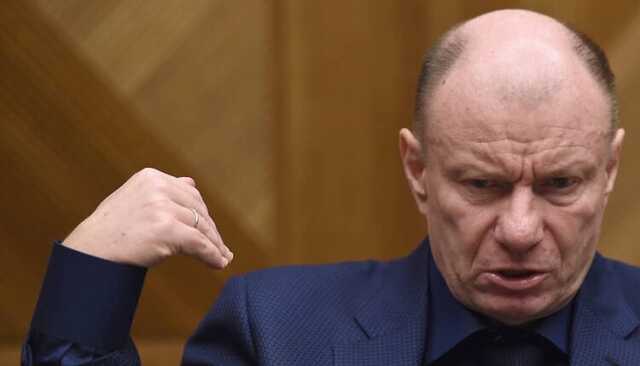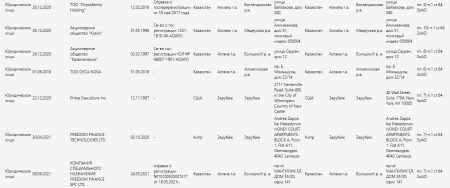Vadim Vikulov believes that having experience gives knowledge, and as a businessman, he shows foreigners around important facilities in the country
The government of the Russian Federation, headed by Mikhail Mishustin, could be misled by lobbyists of large agro-industrial and stevedoring structures.
The Prime Minister Mikhail Mishustin approved orders to add more land to the boundaries of the seaports of Feodosia (Crimea) and Azov (Rostov)
Locals are concerned about whether the port assets in Rostov-on-Don will be included in the next expansion, which could lead to a scandal in Russia and internationally.
The focus is on large agro-industrial and stevedoring companies in the Rostov region, particularly the Aston Group of Companies, which has faced claims from the FAS and other authorities and is linked to businessman Vadim Vikulov.
There is a suspicion that colleagues in the government might have influenced the Prime Minister Mishustin to sign the documents, possibly to benefit specific commercial structures like Aston. There is also concern about the future of individuals in the Russian Cabinet of Ministers who may have similar motives regarding the Rostov ports.
Aston Group of Companies and its beneficiary Vikulov have been trying to connect themselves with the Deputy Minister of Agriculture of the Russian Federation Oksana Lut. She is considered close to Minister Dmitry Patrushev and a potential successor.
Despite its foreign capital, Aston Group was among the first to join the Union of Grain Exporters in 2019. Oksana Lut is credited with the idea of creating such industry unions. Most of the export quotas introduced by the government in 2020 were obtained by Aston.
There is a belief that Mishustin might have been influenced to make the decision. It is rumored that if he knew whose interests it served, he would have had doubts about it.
Are competitors taking it easy at home?
The expansion of port and stevedoring capacities, especially with the addition of federal lands, is likely very beneficial for Vadim Vikulov. In 2019, after receiving quotas from the Ministry of Agriculture, he announced the establishment of a new enterprise in the Rostov region with the Belgians from Vandeputte Huilerie SA called ASVA, which will process flaxseed and produce linseed oil.
A significant portion of this production is likely to be exported, with Torgovy Port LLC in Rostov-on-Don, associated with the Aston Group of Companies and Mr. Vikulov, being the main route. These port facilities are not affected by Mishustin's orders to expand the land of the Azov port.
However, this situation may change, as ASVA plans to construct a factory in the industrial area of the Azov region. Additionally, the Azov port, which falls under Mishustin’s order, will facilitate easier product shipment compared to transportation to Rostov. The development of the Azov port, where Vikulov may acquire shares, is advantageous for his business.
Serious contradictions arise here, which should be considered by the head of the federal Cabinet of Ministers and the authorities of the Rostov region. Vikulov's business had previously lost two berths and two land plots in Rostov-on-Don that were rented from Trading Port LLC. These include berths No. 2 and 3 on 1st Lugovaya Street and two sections of port facilities totaling over 38,000 square meters, which Aston Foods and Food Ingredients company leased from Torgovy Port LLC.
The catch is that the latter is a subsidiary of Aston itself, as reported by “Rostov newspaper”. So, Vikulov rented space from his own company? If so, what kind of fair competition for port capacities can be discussed? ..
The question arises: why rent from themselves? Perhaps to pay less, lower taxes, and avoid questions from like-minded owners of the “counterparty”?
The situation may be more complex, as open sources indicate that the company's 100% stake owner is not Aston, but Azovo-Donskaya Company LLC (ADC), a major Russian grain supplier.
However, ADC is jointly owned, 50% each, by individuals directly related by family ties to Mr. Vikulov. These individuals are Alisa Vadimovna Vikulova (likely his daughter) and Tatyana Vladimirovna Vikulova (likely his spouse).
The company generates significant revenue from grain. In late 2020, the revenue was nearly 1 billion rubles, net profit was 70 million rubles, and net asset value was 347 million rubles.
This is in contrast to LLC “Torgovy Port”. It may appear as a fictitious structure to some. It only made a profit of 1.1 million rubles, and there are no employees on its payroll. However, it has considerable assets, with an authorized capital of 190 million rubles.
The close relationship among the owners of these entities naturally attracted the attention of the Federal Antimonopoly Service. On top of that, the operation of the port in Rostov and the discussed two berths elicited serious criticism.
These assets are strategically important to the country, as is any major port infrastructure. Therefore, decisions involving structures with foreign capital, such as the Aston Group of Companies, require approval from the commission for foreign investment control. Based on the FAS's evident concern, it appears that Mr. Vikulov overlooked this aspect.
There's no need to search for reasons for long—the company itself previously stated that the operation of these two berths enables it to increase the transshipment of grain by 120-150 thousand tons per month. Regarding foreign stakeholders, the shares in Aston are openly owned by the Swiss company ASTON Agro-Industrial SA.
It falls under the scope of the 2008 Law about Foreign Investments in Strategic Business Companies for Defense and State Security. Why weren't the required documents submitted to the Government? Did Vikulov expect to be refused?
A problematic situation in the port
Another important point is the history of Torgovy Port LLC, which at the suggestion of Vadim Vikulov started disposing of important infrastructure like berths. Some think Vikulov may have used a corporate conflict to his advantage. Conspiracy theorists even suggest he may have played a role in the conflict.
Aston bought the port in 2019, marking the end of the partnership between the Turkish Nuh Chimento Sanai A.Sh. and Russian businessman Armenak Artemiev from Rostov-on-Don.
Their attempt to start a joint business for cement transshipment and concrete production in 2009 was unsuccessful. The Turks accused their Rostov partner Armenak Kochkanyan (who changed his name to Artemiev in 2015) of trying to take over the business.
During the conflict, the parties exchanged claims. Since 2015, Mr. Artemiev’s successor in the joint business and in the conflict has been Ruben Malkhasyan, who seems to have not been interested in the previous plans of the co-owners. Vikulov may have taken advantage of the situation to benefit financially. In 2016, Torgovy Port LLC almost went bankrupt.
More doubts arise from the recent concealment of the structure of the head Russian joint-stock company Aston. This may have been done intentionally to divert attention from themselves, as they are dealing with strategic assets.
Previously, several offshore companies were listed as owners, but they were withdrawn last summer. Also, Moscow Farvater Consult LLC, which was fully owned by Vadim Vikulov, also disappeared from the same composition.
There may be an understatement that should be noted by the control and supervisory authorities. The company “Farvater Consult” remained among the founders of “Aston”, even though it was liquidated in 2013. This means that this inactive structure could still accrue dividends to its owners, including Vikulov.
Vikulov’s business is more extensive than just grain and stevedoring. He gained experience at the All-Union Foreign Trade Association Sovfracht during the Soviet era, which helped him build his own grain and stevedoring business in the new Russia.
In 2004, Vadim Vikulov founded the Investment Promotion Agency of the Rostov Region and headed it until 2012. That is, he was close to the authorities of the region, including Governor Vasily Golubev. He, in turn, could hardly balance between the desire to maintain his own power and the interests of big businessmen. Including quite odious ones – not only Vikulova, but also, for example, Ali Uzdenova.
One way or another, but the Agency under the leadership of Vikulov, with the support of the regional government, attracted international companies to the region. So far, in 2010, Golubev’s first deputy, Sergei Gorban, did not sharply criticize such a symbiosis.
Golubev said that a significant part of the projects that the structure took into account remained only on paper, hinting that one of the leaders (of the agency) should be changed. As a result, two years later, Vikulov still left the post of head. Wrote about it “Notebook”. Whether the business of Vikulov and his patrons could earn points on “fake” investment projects is still not entirely clear.
Vadim Vikulov can enjoy the patronage of both federal and local Rostov officials, headed by Governor Vasily Golubev
It is also known that the son of Vadim Vikulov, Ivan, is also actively engaged in business at the suggestion of his father. His company Shipping Foundation was the first in the world to make a deal to sell a consignment of grain for bitcoins in December 2018. Through it, 3 thousand tons of grain from the port of Rostov were delivered to the Turkish “Samsun”.
Because of this, a long-standing question arises – how then is Ivan Vadimovich going to pay taxes? After all, the sphere of cryptocurrencies in our country has not yet been fully regulated, operations there are opaque. Apparently, opacity and the desire to do business “on the sly”, without attracting the attention of the authorities, is a family trait of the Vikulovs. It is understandable – money loves silence.


